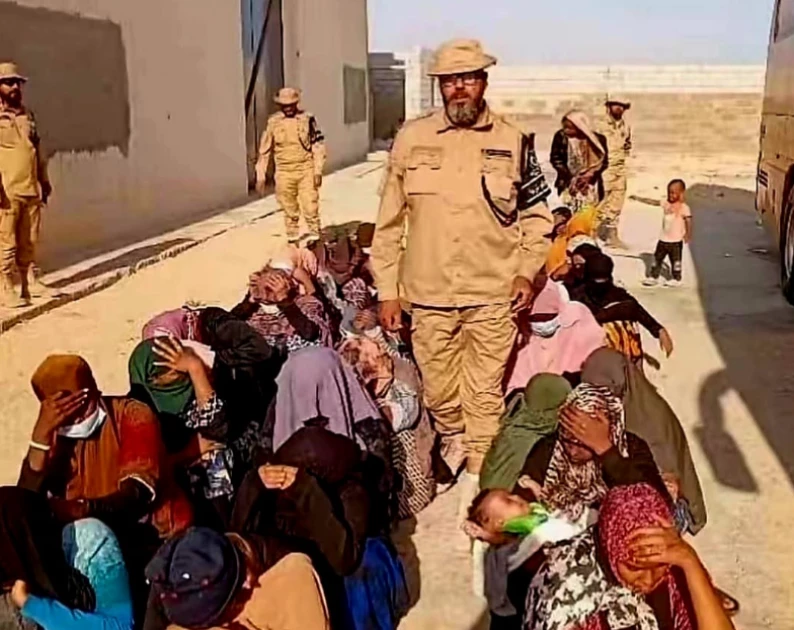How one man went to Libya to save a relative, but freed 400 detained Somali youth

According to humanitarian organizations, more than 7,000 Somali youth—including some from North Eastern Kenya—are currently imprisoned, missing, or held hostage in Libya.

Audio By Vocalize
In early August 2025, Somali
politician Abshir Aden Ferro received a late-night call that would change the
course of his life. A distressed family member informed him that a 25-year-old
relative, who had attempted the perilous journey from Somalia to Europe, had
been arrested and kidnapped upon arrival in Libya.
Ferro - a Somali-born businessman,
politician, and former French military officer and the founder and CEO of
Cruzen Group, a London-based international security firm - said he was already
familiar with Libya’s reputation as a hub where migrants are detained, abused,
and extorted. He hence assured the family that he would do everything in his
power to secure the young man’s release.
“I travelled from Europe to Libya
with the sole intention of freeing my relative. What I encountered there was
horrific,” Ferro recalls.
He spoke on Saturday as youth in
Ijara participated in an engagement forum where they voiced frustration over
lack of opportunity, opting to risk their lives by engaging in the infamous
illegal migration across the Mediterranean and the Black Sea to seek greener
pasture in the Western and Middle Eastern countries. These dangerous trips have
been characterized by boat accidents or abductions by human trafficking gangs.
They asked Garissa Senator Abdul
Mohammed Haji to liaise with Governor Nathif Jama and his deputy Abdi Dagane to
convene a regional leaders’ conference to deliberate on a mechanism for establishing
a kitty to facilitate such pertinent social matters affecting the very core of
the next generation.
According to humanitarian
organizations, more than 7,000 Somali youth—including some from North Eastern
Kenya—are currently imprisoned, missing, or held hostage in Libya.
Many are intercepted while
attempting to cross into Europe or kidnapped by smugglers demanding ransoms as
high as $30,000 (approx. over Ksh.3.8 million) from their families back home.
With Libya functioning as a major
transit hub but lacking central authority, detention centers are often
controlled by militias that exploit migrants for profit. Reports from the
United Nations and aid groups repeatedly document widespread abuse: physical
violence, extortion, forced labor, and sexual exploitation.
Ferro’s mission began as a
personal effort to save one life; but once inside Libya, his determination
grew.
“When I reached the Coastal town
of Tajoura, I used my assets to arrange the release of my loved one. But I
couldn’t morally leave others behind. In the end, I secured the freedom of 400
detainees, including 50 women,” he narrated.
The scale of the release was
unprecedented. The chairperson of the Somali community in Libya described it as
the first time such a large number of detainees had been freed without a single
ransom payment—leaving many astonished. For Ferro, however, the success came at
a heavy personal cost.
“I am sick and still traumatized
by what I saw in those cells. It’s something I can never forget,” he said.
The freed detainees described
nightmarish conditions of life inside Libyan prisons. They spoke of starvation,
overcrowding, torture, and relentless demands for ransom.
Halima, a 22-year-old who spent 18
months in detention, recalled: “We were not living like human beings. They
tortured us when we couldn’t pay ransom. We survived on a small piece of bread
and a cup of water each day. Thankfully, I am now free. I plan to return to
Somalia and will never risk this journey again.”
Mohamed Abdullahi, 19, shared a
similar story. He left Mogadishu with hopes of reaching Europe but was
kidnapped by smugglers demanding $10,000.
“We were tortured, starved, and
locked in overcrowded cells with other Africans. You were lucky only if your
family could send the money,” he says.
For Ferro, the suffering he
witnessed raised urgent questions about Somalia’s leadership and the
international community’s inaction.
“I strongly believe Somali leaders
have failed to address the plight of migrants suffering in Libya. There are no
strategic plans in place to tackle this crisis. When I sat down with the
victims, many broke down in tears. Young girls recounted harrowing experiences
of mistreatment and abuse. Their pain is beyond words,” he says.
The ordeal of these young Somalis
highlights a much broader humanitarian crisis. European-funded migration
control programs often empower Libya’s coast guard to intercept migrant boats,
trapping Somalis and others in militia-run detention centers.
Unable to move forward or return
home, thousands remain caught in a devastating cycle of exploitation.
The release of 400 detainees
through Ferro’s intervention offered a rare moment of hope in an otherwise
bleak reality.
But for every individual freed,
thousands remain in captivity—a living evidence of how unsafe migration routes
and international neglect continue to destroy lives.
Ferro’s actions demonstrate how
determination and courage can save lives, yet they also reveal the inadequacy
of current systems in protecting vulnerable migrants.
Until structural solutions are put
in place—including safe migration pathways and stronger international
protections—Somali youth will continue to risk their lives, falling prey to
smugglers and militias.
Reflecting on the mission, Ferro
says: “By the grace of God, I happened to meet other victims, and we brought
them out. But thousands more are still trapped, and their cries must not be
ignored.”


Leave a Comment